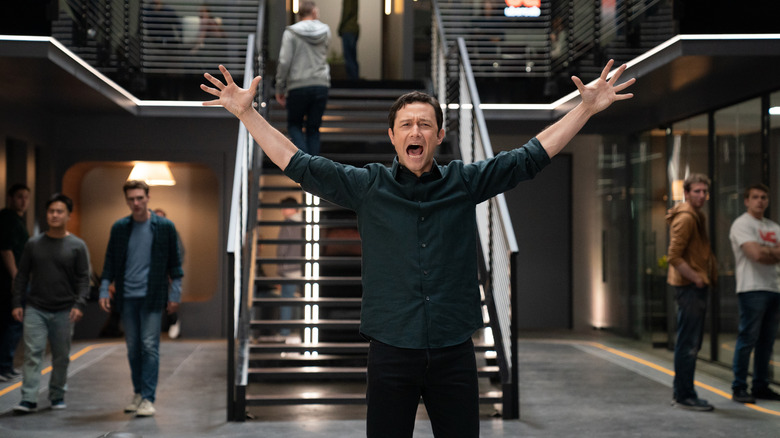Super Pumped Review: A Bold, Provocative Takedown Of Silicon Valley In Search Of A Deeper Point
How do you craft a story when everyone already knows how it ends?
That's far from a new concept when it comes to making movies or shows based on true events, but attempting to dramatize a widely-publicized and fairly recent story still brings its own challenges. Created, written, and executive produced by "Billions" veterans Brian Koppelman, David Levien, and Beth Schacter, Showtime's "Super Pumped: The Battle for Uber" meets these challenges head-on and with a brash, self-aware, and even reckless sense of flair ... not entirely unlike the actual subject of the series, in some ways. As the sleazy and hopelessly power-hungry Uber founder Travis Kalanick (known as "TK" to his close associates and "Travis" to his enemies, as he puts it), Joseph Gordon-Levitt makes a veritable meal out of his surroundings and unleashes waves of pent-up, manic energy that'll make you wish we saw this version of the actor on-screen much more often. His very first line of dialogue, holding an impromptu job interview with a prospective Uber applicant, immediately establishes the tone of the series while cheekily setting viewers up for everything that's to come: "Are you an a**hole?"
It'd be grossly overstating things to claim that this question represents the mission statement behind "Super Pumped," or the thematic justification for its existence, though it does raise the question of what exactly the main takeaway from the anthology series, based on Mike Isaac's 2019 book of the same name and already greenlit for a second season, might be. Sure, the parallels between this and David Fincher's "The Social Network" are obvious and immediate ("Zuck" gets a handful of name-drops early on, and none of them particularly flattering), both featuring duplicitous tech founders building their groundbreaking companies through ill-gotten gains.
The difference, however, is Kalanick isn't secretly fretting about his perception among others; he is unconcerned about whether anyone actually likes him or not — well, save one individual who's well worth leaving unspoiled. No, what we see is what we get. Instead, the series chooses to skip over the early "Facemash"-equivalent phase of Kalanick's life entirely and simply present his shallowness as a given, to its detriment.
In another faint echo of "The Social Network," the episodes opt for a (much less elegant) mishmash of timelines, kicking off in medias res and years into Uber's steady rise before hitting the brakes and flashing back to the events of 2011, with Kalanick on the verge of landing the investor of a lifetime ... if he plays his cards right. Immediately, the tension between Kalanick and Bill Gurley (Kyle Chandler, steady and reliable as always) dominates the proceedings, summarized neatly by the refreshingly blunt Texan Gurley, a mentor figure who insists on a straight-shooter approach, going up against Kalanick's shameless flurry of sales pitches and obfuscation, characterized most evidently by Gordon-Levitt's big, s**t-eating grin.
Though the series eventually finds its footing well enough, "Super Pumped" gets off to a rocky start that never quite evens out, precisely because we never get to see what makes Travis so driven in the first place. At least not in the first 5 episodes made available to the press beforehand. Regardless, it's not a particularly winning formula to leave viewers persistently wondering about what exactly makes the protagonist tick, even though it is entertaining to watch this self-styled "bad boy of tech" go to increasingly questionable lengths to maintain Uber's tenuous hold on Silicon Valley and, eventually, cities around the world.
"The Social Network" grounded Mark Zuckerberg's (Jesse Eisenberg) almost pathological coldness in the pettiest and most basic of human (and distinctly male) motivations. "The Wolf of Wall Street" held a mirror up to its unrepentant monster and showed us, the complicit viewers, as stand-ins for Jordan Belfort's (Leonardo DiCaprio) reflection instead. With "Super Pumped," however, I never quite managed to put a finger on why exactly this story about Travis Kalanick's spectacular self-implosion behind the wheel of Uber needed to be told in this way, or what extra layer of meaning it found in doing so. But boy, is it fun to rubberneck and watch the wheels come off anyway.
A look under the hood
If certain script choices end up letting air out of the tires of "Super Pumped" before it can really get rolling, then at least the technical merits help bridge that gap and tell the story in the most compelling way possible. To its credit, "Super Pumped" uses every trick in the metaphorical book (and a few completely absent from it, as well) to depict instances of corporate backstabbing, desperate power plays, and "tech bro" culture run amok with a gauzy and sneakily seductive touch ... even if it takes too long for the series to successfully lull us into rooting for the insufferably bullheaded Kalanick's schemes rather than against his undeserved success (for a time, at least).
Impressively, creators Brian Koppelman, David Levien, and Beth Schacter go out of their way to put us in Kalanick's headspace with a bag full of wonderfully off-putting stylistic choices that (mostly) work as intended. First and most apparent, there's the unmistakable Quentin Tarantino narration that veers into distractingly meta territory, as he's more or less playing himself. Overall, this ultimately feels like a misfire, if only because the freeze-frame pauses for character introductions, brief exposition dumps, and flashy graphics come haphazardly, without ever really adding any insights that weren't already apparent. Clearly chasing the coattails of something like Margot Robbie's cameo in Adam McKay's "The Big Short" (or, more obnoxiously, reminiscent of certain moments in McKay's more recent "Don't Look Up"), these rapid-fire intrusions are stuck in no man's land. They arrive far too infrequently to feel overbearing, fortunately enough, but just sporadically enough to feel wholly unnecessary — as if added at the last possible minute to liven things up.
Thankfully, viewers are treated to much more effective instances elsewhere that walk us through Kalanick's lies, allowing him to squirm in and out of any sticky situation that he finds himself in. The ideas of perspective and unreliable narration come into play during key moments of blatantly rewritten memories on the fly, where we get a unique glimpse at the unseen and unheard truth behind his steady drip of deceptions (or is it denial?). Moments like when we find out who really came up with the idea of Uber and its "disruptor" status in the industry, for example. These instances add energy and a much-welcomed boost of visual storytelling to keep pace with such an ostentatious main character, almost as if Kalanick's psyche and unmanageable ego were bleeding onto the screen itself.
A dramatic meeting in a later episode makes full use of this heightened approach. Here, we see a literal whiteboard full of potential dialogue options looming behind Kalanick's head, projecting all the lies the shifty CEO has at his disposal at a time when his rampant misconduct and shady business practices — invasion of customer privacy, refusal to allow tips for drivers, a work environment rife with harassment and abuse, and more — are all called onto the carpet. Frustratingly, I could easily imagine a hypothetical version of "Super Pumped" where this sequence was used as a framing device for the entire series, providing a natural and intuitive way to look back at this story in chronological order and dissect every one of Kalanick's failings, from the inception of Uber to Kalanick's ultimate demise as leader of the company. Instead, this turning point functions as the backbone of the fifth and strongest episode in the series when, perhaps, it could've served an even greater purpose in the long run.
If nothing else, "Super Pumped" goes to show how much technical prowess can keep an entire show on the road, even when it threatens to veer off-track.
A ride to nowhere
Speaking of veering off-track: If it seems like I've made it this far talking predominantly about the antics of Travis Kalanick at the expense of almost the entire supporting cast of characters, especially the women, well, that's sort of by design.
"Super Pumped" is a series well-aware of the major bullet points it needs to hit in this portrayal of the frat-bro techie's downfall, signposts that each episode accurately renders in all their outsized absurdity. But when it comes time to tackle the ingrained gender disparity that rots Uber from the inside out, it's telling and incredibly disappointing, then, that the subplot featuring the most amount of uninterrupted screen time devoted to its women also turns out to be the show's clunkiest, by far.
On paper, the writing team takes pains to depict the few women in the picture up to this point — Travis' mother Bonnie (Elizabeth Shue), his initial girlfriend Angie (Annie Chang), Bill Gurley's wife Amy (Jessica Hecht), and eventually business mogul Ariana Huffington (Uma Thurman) — as brilliant and capable individuals in their own right. They quote J.D. Salinger and practice meditation and generally impart supportive bursts of sudden insight, making them seem like the smartest and most well-rounded people in the room. In actual practice, however, each of the four characters essentially functions as little more than a discount therapist. None of their words of wisdom can make up for the glaring lack of actual interiority on their part, merely rendering them hollow mouthpieces and narrative shortcuts to motivating the respective men in their lives.
This problem only worsens when the focus shifts to the "toxic" (a word the show would prefer we didn't use) work environment at Uber in the fourth episode. The clumsy (and, for those particularly sensitive to reports of sexual harassment getting brushed aside, potentially triggering) handling of abuse in the workplace is treated with all the sobriety it deserves, primarily through the perspectives of Kalanick's trusted ringer/driver recruiter Austin (Kerry Bishé) and new Uber employee Susan Fowler (Eva Victor, of "Billions" fame), but not even a challenging and prolonged fourth-wall-breaking sequence makes up for the fact that both "characters" seem to exist for the sole purpose of advancing this one single plotline.
It's also here where the aforementioned bullet points of Travis Kalanick's demise start to resemble more of a Wikipedia summary, with the creative team checking off every oversight and willful instance of lawbreaking under Kalanick's watch without ever fully contextualizing any of them. Kalanick flagrantly breaks laws, treats his employees horrifically, and generally behaves as if he were the physical manifestation of white privilege itself ... but what larger point does "Super Pumped" add to any of these well-documented misdeeds?
Obviously, Uber is still thriving — popular, profitable, and as polarizing as ever. Its troubled founder and now-former CEO, to say the least, is not. "Super Pumped" takes a twisting and oftentimes thrilling path in guiding us towards that inevitable conclusion, though it seems to have missed the forest for the trees along the way. This may very well be the boldest, most provocative, and most compelling feel-bad story of the year so far ... but it's one that's still searching for a deeper, more meaningful point to make.
"Super Pumped: The Battle for Uber" premieres Sunday, February 27, 2022, on Showtime.


